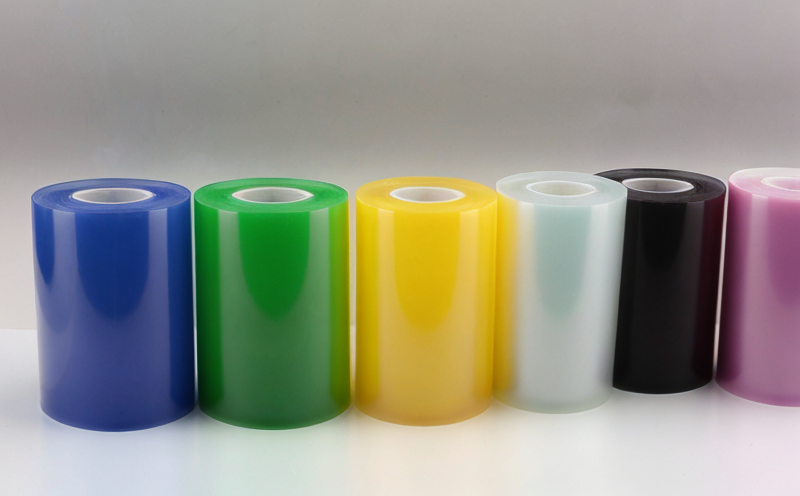Tensile Strength Universal Testing Machine Test
In the realm of polymer and plastics testing, particularly within plastic films & sheets testing, determining tensile strength is a critical metric. Tensile strength refers to the maximum stress that can be sustained by a material before it breaks or fractures under tension. This test is pivotal for quality managers, compliance officers, R&D engineers, and procurement professionals as it ensures that materials meet required standards and specifications.
The tensile strength universal testing machine (UTM) is designed to apply controlled tensile forces to specimens until they break. The UTM measures the stress-strain relationship, providing valuable insights into material performance under tension. This service is essential for industries reliant on plastic films & sheets, such as packaging, automotive, electronics, and construction.
Specimens are typically cut from larger sheets or rolls of plastic film, ensuring that they represent the properties of the bulk material accurately. The UTM can apply forces ranging from a few Newtons to several thousand kilonewtons (kN), depending on the scale required for the test.
The testing process involves securing the specimen between two clamps within the UTM's grips. The machine then applies force at a controlled rate, measuring how much load the sample can withstand before failure occurs. This data is captured in real-time and recorded as part of the tensile strength report.
Understanding the tensile properties of plastic films & sheets is crucial for several reasons. For example, manufacturers need to ensure that their products are robust enough to handle transportation and storage conditions without damage. Additionally, regulatory compliance often mandates specific tensile strength values, which must be met to avoid costly penalties or product recalls.
The UTM test also helps in optimizing material formulations during R&D phases. Engineers can adjust additives, fillers, or blending ratios based on the results of tensile tests to enhance performance without compromising other properties like flexibility or cost.
Furthermore, this service supports procurement activities by providing data that ensures suppliers meet quality standards. By specifying minimum tensile strength requirements in contracts, buyers can mitigate risks associated with substandard materials entering their supply chain.
In summary, the tensile strength UTM test is a cornerstone of polymer and plastics testing, offering critical insights into material performance under tension. Its importance cannot be overstated for industries dependent on plastic films & sheets, where quality assurance and compliance are paramount.
Applied Standards
| Standard | Description |
|---|---|
| ASTM D882-18 | Determination of tensile properties of thin plastic sheets, films and similar flexible materials. |
| ISO 527-3:2014 | Tensile testing of plastics - Part 3: Tension test for fibers in the direction of elongation. |
| EN ISO 178:2019 | Determination of tensile properties of plastics - Narrow strips, 5 mm wide or less. |
| IEC 60293-2-1 | Tensile tests for flexible insulation materials used in electrical and electronic equipment. |
| ASTM D4545-17 | Determination of tensile properties by means of dumbbell specimens with a 2:1 aspect ratio. |
| ISO 604:2018 | Tensile testing of plastics - Particular test conditions for thin films and sheets. |
Scope and Methodology
The scope of the tensile strength UTM test encompasses a range of plastic films & sheets, including polyethylene (PE), polypropylene (PP), polystyrene (PS), and other engineering plastics. The methodology involves carefully selecting specimens that are representative of the larger material batch or roll.
Before testing, the specimens undergo rigorous preparation to ensure consistency in size, shape, and condition. This includes trimming excess edges, ensuring flat surfaces, and maintaining a consistent thickness throughout the sample. The UTM is calibrated according to manufacturer specifications to ensure accurate measurements.
The test procedure involves mounting the specimen between the grips of the UTM. The machine then applies force at a specified rate, typically ranging from 5 mm/min to 100 mm/min, depending on the material's expected properties. The load and displacement are continuously monitored until failure occurs.
Data collected during testing includes peak tensile strength (in MPa or psi), elongation at break (%), and modulus of elasticity (MPa). These parameters provide a comprehensive understanding of the material's mechanical behavior under tension.
The results are analyzed using statistical methods to ensure that they fall within acceptable limits. Acceptance criteria vary by standard, but typically involve comparing test results against specified minimum values for tensile strength and elongation at break.
Why Choose This Test
The tensile strength UTM test is indispensable for ensuring product quality and regulatory compliance in polymer and plastics testing. Here are several compelling reasons why this service should be chosen:
- Comprehensive Quality Assurance: The test provides a detailed analysis of material performance, helping to identify any weaknesses or inconsistencies.
- Regulatory Compliance: Many industries have strict requirements for tensile strength that must be met to avoid legal penalties and product recalls.
- R&D Optimization: Engineers can use test results to refine material formulations, enhancing performance without sacrificing other critical properties.
- Supplier Evaluation: By specifying minimum tensile strength requirements in contracts, buyers can ensure that only high-quality materials enter their supply chain.
- Cost Efficiency: Early identification of substandard materials through testing helps prevent costly rework or product failures downstream.
- Innovation Support: The test provides valuable data for developing new products and improving existing ones, fostering innovation in the industry.





